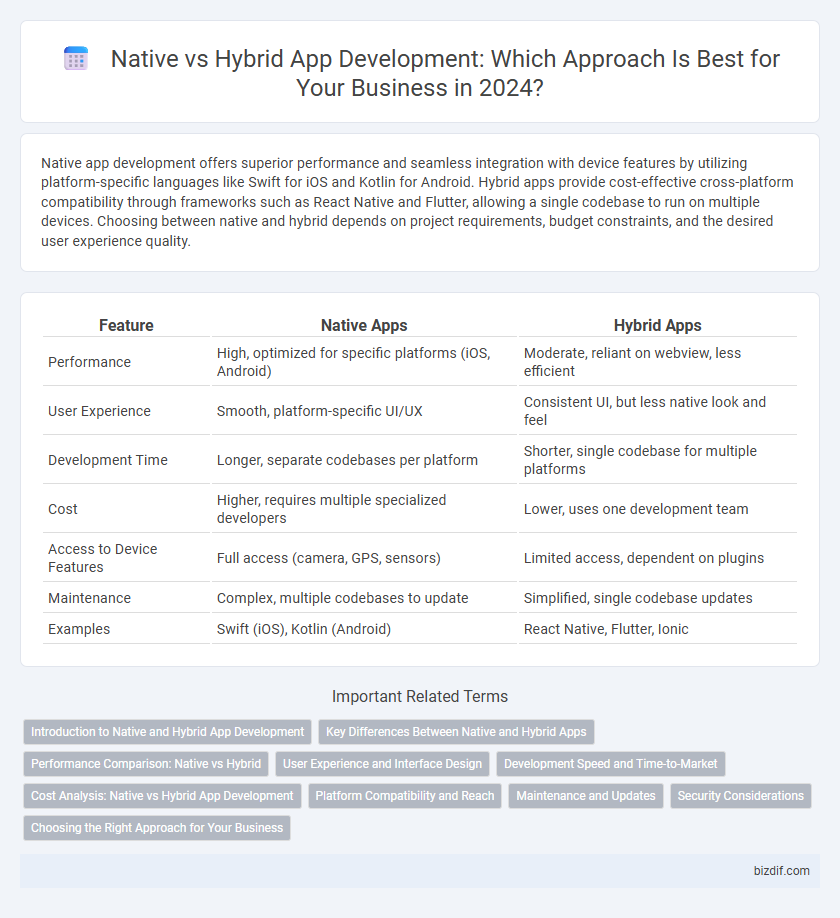Native app development offers superior performance and seamless integration with device features by utilizing platform-specific languages like Swift for iOS and Kotlin for Android. Hybrid apps provide cost-effective cross-platform compatibility through frameworks such as React Native and Flutter, allowing a single codebase to run on multiple devices. Choosing between native and hybrid depends on project requirements, budget constraints, and the desired user experience quality.
Table of Comparison
| Feature | Native Apps | Hybrid Apps |
|---|---|---|
| Performance | High, optimized for specific platforms (iOS, Android) | Moderate, reliant on webview, less efficient |
| User Experience | Smooth, platform-specific UI/UX | Consistent UI, but less native look and feel |
| Development Time | Longer, separate codebases per platform | Shorter, single codebase for multiple platforms |
| Cost | Higher, requires multiple specialized developers | Lower, uses one development team |
| Access to Device Features | Full access (camera, GPS, sensors) | Limited access, dependent on plugins |
| Maintenance | Complex, multiple codebases to update | Simplified, single codebase updates |
| Examples | Swift (iOS), Kotlin (Android) | React Native, Flutter, Ionic |
Introduction to Native and Hybrid App Development
Native app development involves creating applications specifically designed for a particular operating system using platform-specific programming languages like Swift for iOS and Kotlin for Android. Hybrid app development combines web technologies such as HTML, CSS, and JavaScript within a native container, enabling a single codebase to run across multiple platforms. Choosing between native and hybrid approaches affects performance, user experience, development time, and maintenance costs in mobile app projects.
Key Differences Between Native and Hybrid Apps
Native apps are developed specifically for a single platform using platform-specific programming languages like Swift for iOS or Kotlin for Android, ensuring superior performance, enhanced security, and access to full device capabilities. Hybrid apps, built with web technologies such as HTML, CSS, and JavaScript, run inside a native container allowing cross-platform compatibility but often experience limitations in speed and hardware integration. The primary differences include user experience quality, development time, maintenance cost, and ability to leverage native device features.
Performance Comparison: Native vs Hybrid
Native apps deliver superior performance by directly accessing device hardware and system APIs, resulting in faster load times, smoother animations, and more responsive user interactions. Hybrid apps, while easier to develop across multiple platforms, often suffer from performance bottlenecks due to the additional abstraction layer of web technologies like HTML5, CSS, and JavaScript running inside a native container. Benchmark tests reveal that native apps outperform hybrid counterparts in CPU-intensive tasks, graphics rendering, and offline functionality, making them the preferred choice for high-performance requirements.
User Experience and Interface Design
Native app development offers superior user experience and interface design by leveraging platform-specific UI components and native performance optimizations, resulting in faster load times and smoother interactions. Hybrid apps, while cost-effective and easier to maintain across multiple platforms, often face limitations in UI responsiveness and design consistency due to reliance on web technologies wrapped in native containers. Prioritizing native development enhances user engagement through intuitive navigation and seamless hardware integration, critical factors in app retention and satisfaction metrics.
Development Speed and Time-to-Market
Native app development offers faster performance but requires more time due to platform-specific coding for iOS and Android. Hybrid apps utilize a single codebase across multiple platforms, significantly reducing development time and accelerating time-to-market. Choosing hybrid development is ideal for businesses prioritizing rapid deployment over platform-specific customization.
Cost Analysis: Native vs Hybrid App Development
Native app development typically incurs higher upfront costs due to platform-specific coding for iOS and Android, requiring separate development teams and longer timelines. Hybrid app development offers cost efficiency by enabling a single codebase to run across multiple platforms, reducing development time and resources. However, hybrid apps may face performance trade-offs that could impact the overall return on investment compared to fully optimized native apps.
Platform Compatibility and Reach
Native app development offers superior platform compatibility by utilizing specific SDKs and APIs for iOS and Android, ensuring seamless performance and access to device features. Hybrid apps provide broader reach by running on multiple platforms through a single codebase, reducing development time and costs. Choosing between native and hybrid depends on prioritizing optimal user experience or maximizing audience coverage.
Maintenance and Updates
Native app development offers streamlined maintenance and faster updates due to platform-specific tools and direct access to APIs, reducing compatibility issues. Hybrid apps often face complex maintenance challenges because updates must be compatible across multiple platforms, potentially causing delays and increased testing efforts. Efficient update deployment in native apps enhances user experience by delivering timely improvements and bug fixes tailored to each operating system's requirements.
Security Considerations
Native app development offers enhanced security by leveraging platform-specific features such as secure storage, biometric authentication, and encrypted keychains, reducing vulnerabilities inherent in hybrid frameworks. Hybrid apps rely on web technologies and cross-platform code, increasing the attack surface through webview containers and exposing APIs that can be exploited if not properly secured. Developers prioritizing data protection and compliance with regulations like GDPR or HIPAA should consider native development to implement robust, platform-level security measures.
Choosing the Right Approach for Your Business
Selecting between native and hybrid app development hinges on your business goals, target audience, and budget constraints. Native apps deliver superior performance and seamless user experiences by leveraging platform-specific features, ideal for businesses prioritizing quality and responsiveness. Hybrid apps offer cost-effective, cross-platform solutions with faster deployment times, making them suitable for businesses seeking broader reach with limited development resources.
Native vs Hybrid Infographic

 bizdif.com
bizdif.com